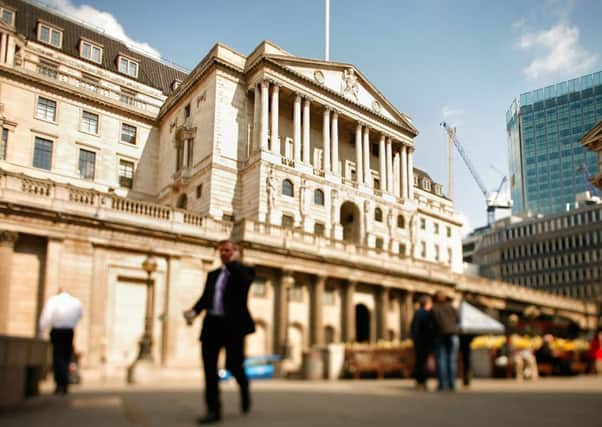BoE warns of new year slowdown after holding rates
This article contains affiliate links. We may earn a small commission on items purchased through this article, but that does not affect our editorial judgement.


Policymakers said while growth had been “remarkably steady” since the Brexit vote shock, cracks were starting to show in the business sector as firms put investment decisions on hold.
All nine members of the Bank’s monetary policy committee (MPC) voted to keep rates at 0.25 per cent in the last decision of the year.
Advertisement
Hide AdAdvertisement
Hide AdIt comes after the US Federal Reserve hiked rates last night for the first time since December 2015 and signalled three more rises in 2017 as the world’s largest economy continues to strengthen.
Britain’s economy is expected to grow by 0.4 per cent in the fourth quarter, down from 0.5 per cent in the previous three months, according to the Bank.
But minutes of the MPC meeting confirmed growth in 2017 was set to falter, with recent surveys highlighting uncertainty among businesses ahead of the Brexit negotiations.
“Forward-looking components of business surveys were weaker than those regarding current output,” according to the MPC minutes. “Some slowing in activity was therefore in prospect during 2017.”
Sterling slid sharply against the dollar to $1.24 on the news, down 0.7 per cent on the day and extending falls from Wednesday when the US Federal Reserve hiked rates, causing the greenback to spike.
The Bank said the recent strengthening in the pound, which had risen by about 6 per cent since November, meant inflation may not rise as sharply as it forecast in its last quarterly report.
But it warned inflation was still set to race higher in 2017 and 2018 as the weak pound pushes up prices, adding sterling was set for “month-on-month” volatility as the UK’s Brexit plans evolve.
Consumer prices index (CPI) inflation surged to a two-year high of 1.2 per cent last month in a sign that the pound’s sharp fall since the referendum is beginning to impact prices.
Advertisement
Hide AdAdvertisement
Hide AdThe Bank recently predicted that CPI will jump close to 3 per cent in 2017, while influential think-tank the National Institute of Social & Economic Research has said it could hit almost 4 per cent next year.
But in minutes of the latest rates decision, the Bank said the pound’s recent strengthening “would result in a slightly lower path for inflation than envisaged in the November inflation report, though it is still likely to overshoot the target later in 2017 and through 2018”.
It added that consumer spending was holding up well, while the housing market remained resilient.
Figures out separately from the Office for National Statistics showed retail sales rose by 0.2 per cent month-on-month in November.
The Bank halved the base rate in August as part of a mammoth economy-boosting package of measures and said more cuts were on the cards, though it has since rowed back on this as growth has proved better than expected.
Growth of 0.5 per cent in the third quarter confounded expectations of a sharp slowdown from the 0.7 per cent seen in the previous three months. That saw the Bank scrap plans for more rate reductions at its November meeting and raise growth forecasts for this year and next.
But this cheery outlook was overshadowed as it sent out a warning shot to households over soaring inflation. Experts fear this will bring an end to the consumer spending surge that has helped prop up growth since the referendum.
In an open letter to the Chancellor explaining why inflation currently remains below the 2 per cent target, Bank governor Mark Carney said the MPC would look through the upcoming CPI overshoot.
Advertisement
Hide AdAdvertisement
Hide AdHe said action to bring down inflation would otherwise lead to “lost output and higher unemployment”, adding that the MPC’s aim was to ensure inflation returned to target in a “suitable manner”.
The Bank will next decide on interest rates on 2 February, when it also releases its next quarterly inflation report.
